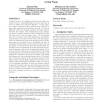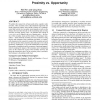WCNC
2008
IEEE
14 years 6 months ago
2008
IEEE
— In an opportunistic spectrum sharing (OSS) wireless network there are two types of users: primary users and secondary users. The primary users own the license for the system ba...
ICASSP
2008
IEEE
14 years 6 months ago
2008
IEEE
—We consider power control in spectrum overlay networks (also referred to as opportunistic spectrum access) where secondary users identify and exploit instantaneous and local spe...
GLOBECOM
2008
IEEE
14 years 7 months ago
2008
IEEE
—Cooperative spectrum sensing has been shown to greatly improve the sensing performance in cognitive radio networks. However, if the cognitive users belong to different service p...
MOBICOM
2009
ACM
14 years 7 months ago
2009
ACM
Cognitive radio is an enabling technology that allows unlicensed users to opportunistically access the spectrum in order to enhance the spectrum efficiency. In this paper, we cons...
MOBICOM
2009
ACM
14 years 7 months ago
2009
ACM
We address the connectivity of large-scale ad hoc cognitive radio networks, where secondary users exploit channels temporarily and locally unused by primary users and the existenc...
INFOCOM
2009
IEEE
14 years 7 months ago
2009
IEEE
—Cooperative spectrum sensing is attracting more attention in Cognitive Radio networks. This paper proposes a fully distributed consensus-based cooperative spectrum sensing schem...
ICASSP
2009
IEEE
14 years 7 months ago
2009
IEEE
—Spectrum access is an important function of cognitive radios for detecting and utilizing spectrum holes without harming the legacy systems. In this paper, we propose novel coope...
GLOBECOM
2009
IEEE
14 years 7 months ago
2009
IEEE
—In this paper, we model and analyze the interactions between secondary users in a spectrum overlay cognitive system as a cognitive MAC game. In this game, each secondary user ca...



